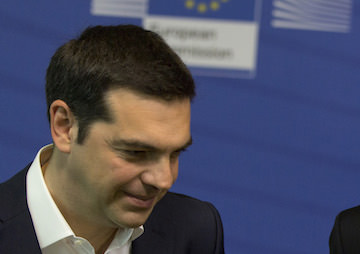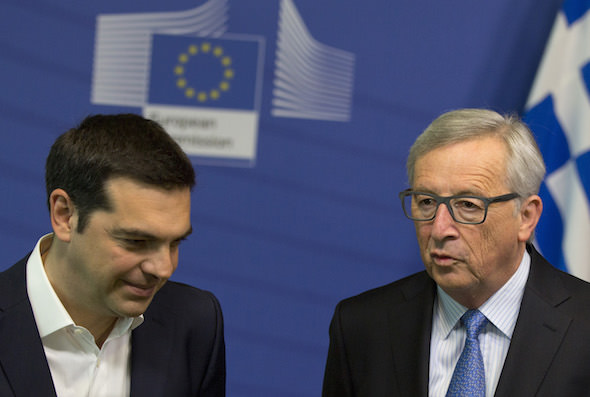Through Feints and Provocations, the Greek Debt Drama Will Continue
“There has been nothing but bad news,” writes The Guardian’s economics editor Larry Elliott of the Greek debt crisis. “Yet, through it all, the relative calm in the financial markets has reflected a belief that, despite everything, the drama Tsipras of Athens will have a happy ending.”

Greek Prime Minister Alexis Tsipras, left, and European Commission President Jean-Claude Juncker. (Virginia Mayo / AP)
“There has been nothing but bad news,” writes The Guardian’s economics editor Larry Elliott of the Greek debt crisis. “Yet, through it all, the relative calm in the financial markets has reflected a belief that, despite everything, the drama Tsipras of Athens will have a happy ending.”
In the past 72 hours, Greece and its creditors evaded a default on the country’s debts and a potential exit from the European economic regime after talks between with ministers from the zone’s 19 member countries broke down Thursday. “But negotiations in Europe rarely end,” Elliott writes. “Instead, they are resumed at a later date, and so it was agreed that eurozone leaders would hold a summit on Greece on Monday following yet another meeting of finance ministers earlier in the afternoon.”
On Friday, the European Central Bank announced, for the second time in three days, that it was giving Greek banks the money they need to remain solvent — but only until a summit scheduled for Monday. “The implied threat was clear,” Elliott continues. “[D]o a deal or we cut off the money and your banks go bust.”
This classic example of the iron fist in the velvet glove appears to have worked. Although the three main actors in the Greek crisis have sometimes given the impression that they cannot stand the sight of each other, none actually wants the euro to lose a member. Alexis Tsipras is a conflicted politician: he thinks an end to austerity is needed if Greece is to start climbing out of the deep economic hole into which it has disappeared over the past five years. But he knows that, by a large margin, the Greek people want to stay in the euro. The price of staying in the euro may well involve swallowing fresh austerity measures.
His co-star, Angela Merkel, is also torn. The German people are fed up with writing cheques to bail out Greece but remain committed to the European project. Merkel does not want to be held responsible for the disintegration of the euro. Nor does the main supporting actor, Jean-Claude Juncker, who has just taken over as president of the European commission, and whose reputation as the fixer-in-chief is on the line.
As a result, talks have been going on all weekend to see if a compromise can be reached. These negotiations have been influenced by Russia and the United States, more accustomed to lead roles but on this occasion lower down the billing. Tsipras has been flirting with Putin, something that has not gone down well with Barack Obama. Washington has made its feelings known.
A deal will likely consist of the “usual can-kicking exercise,” Elliott continues. Greece may offer some compromises on pensions and taxes in exchange for emergency funds and a promise of debt relief later if it continues to reform its economic policies. This would not fix Greece’s economy. If Tsipras accepts this deal, he will face a political backlash at home, but if he remains defiant he will face a bank run in Greece by Tuesday.
— Posted by Alexander Reed Kelly.
Independent journalism is under threat and overshadowed by heavily funded mainstream media.
You can help level the playing field. Become a member.
Your tax-deductible contribution keeps us digging beneath the headlines to give you thought-provoking, investigative reporting and analysis that unearths what's really happening- without compromise.
Give today to support our courageous, independent journalists.





You need to be a supporter to comment.
There are currently no responses to this article.
Be the first to respond.